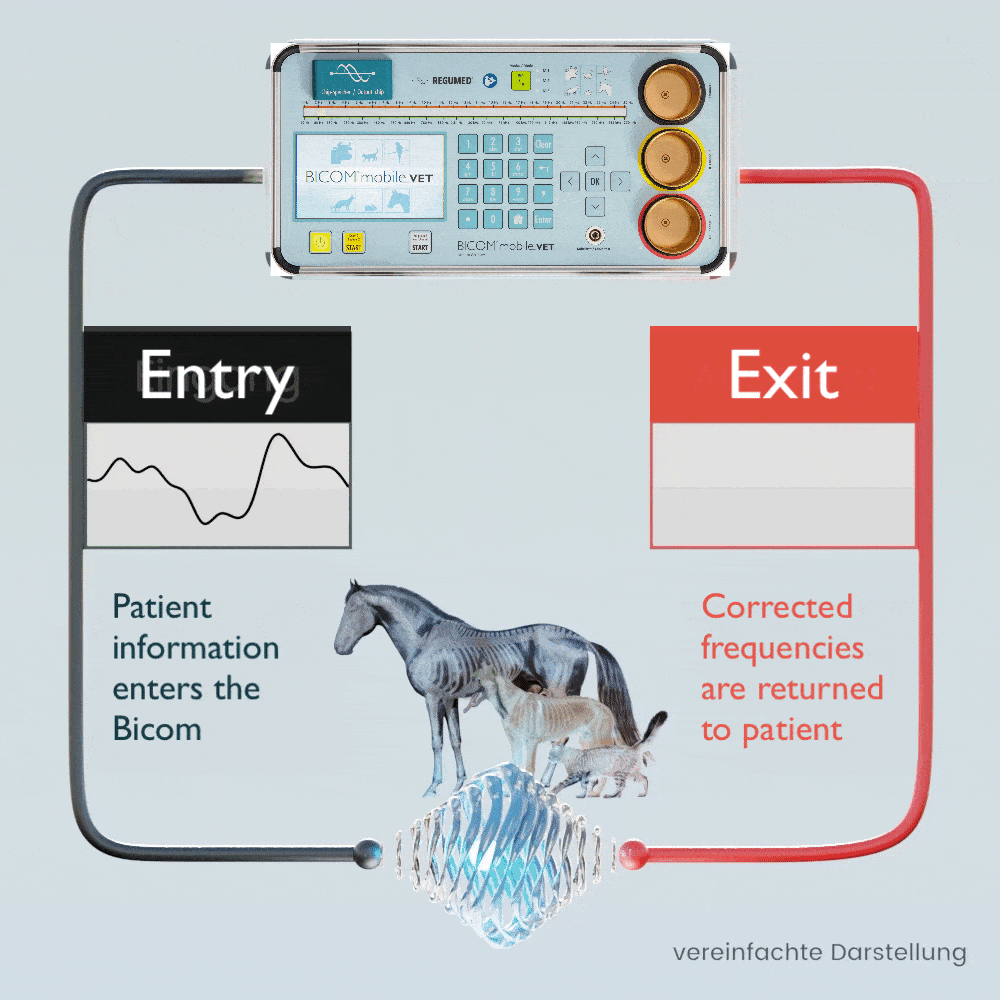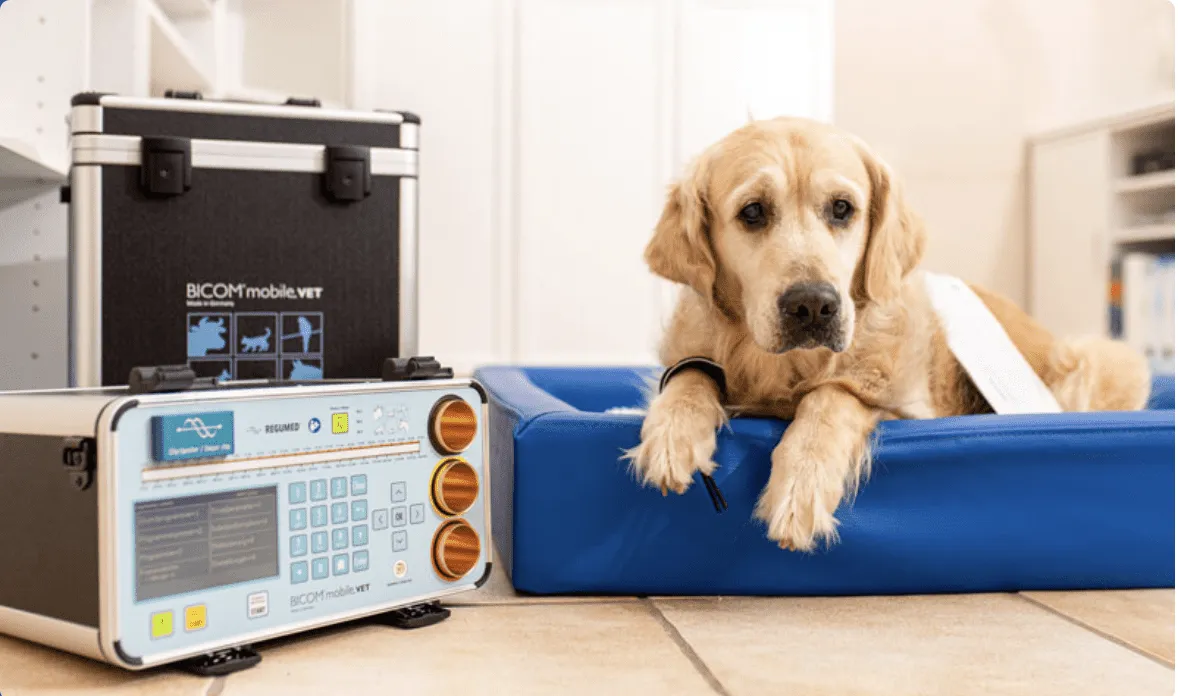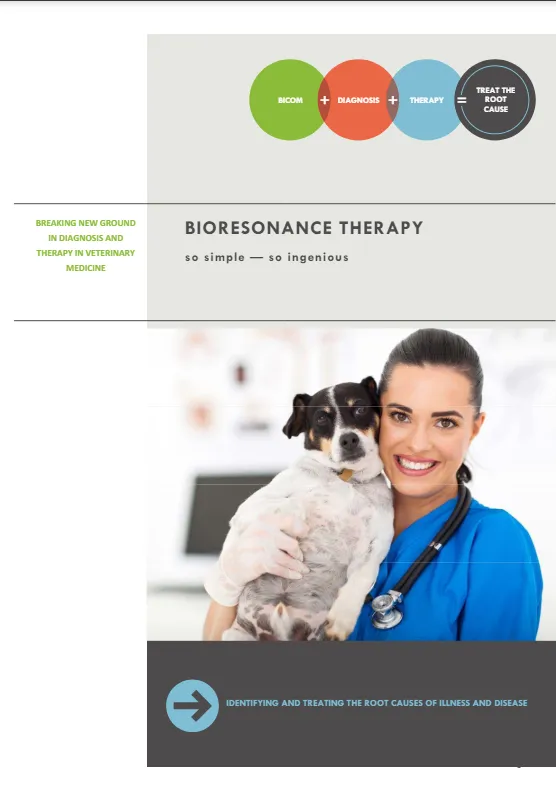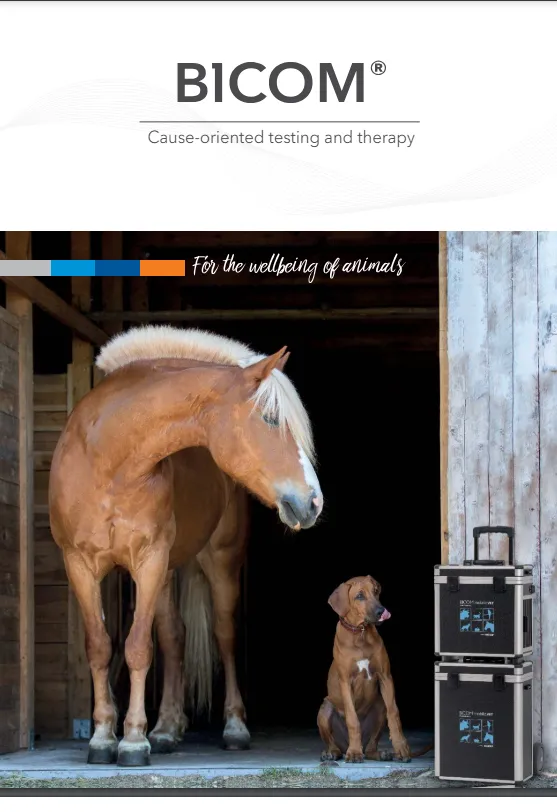Treatment with the help of the patient’s own information
in the BICOM® mobile VET bioresonance device
In contrast to other “frequency therapy devices”, BICOM® bioresonance is a method that is highly individual and perfectly tailored to the needs of the patient through the use of the patient’s own information and the possibility of testing specific wave patterns for resonance.
The patient’s own pathological and physiological information is recorded using special applicators and fed into the BICOM® mobile VET.
Depending on the therapy program, the specific wave pattern as a carrier of information is amplified, weakened or inverted and transmitted back to the patient in modulated form, which means that the transmission of information changes in clarity depending on the modulation or it disappears completely.
The treatment signals continuously adapt to the changing pathological situation of the patient. As the therapy progresses, the body’s ability to regulate is reactivated.
Find out more about this topic at our regular events. Together with veterinarians and animal naturopaths, we offer various face-to-face and online events .
The BICOM® bioresonance method is a cause-oriented, holistic treatment concept. It can narrow down the cause of the health problem in animals and find out even the hidden causes of the clinical picture.
Animals have a natural regulatory system that can also compensate for unusual influences. However, even good self-healing powers eventually reach their limits. Persistent exposure to allergens, environmental toxins, fungi, viruses, bacteria or stress and changed living conditions weaken the immune system and are often the cause of an illness. In particular, fungal infestation on the skin or chronic diseases in general are not always due to a breeding-related genetic defect, but are signs of a disturbed immune system.
The BICOM® bioresonance method is the key to successful diagnosis and therapy, especially for animals that cannot tell us exactly where it hurts or what the symptoms are. It is a gentle form of therapy that can be carried out without side effects and without additional stress for the animal.
The BICOM® mobile VET records the bioenergetic state of the animal, processes the information it contains and returns modified vibrations / therapy frequency patterns to the animal. Symptoms and stress can be diagnosed and targeted therapy can be initiated.
Through the use of endogenous and exogenous substances, the body’s own self-healing powers can be activated and imbalances that have existed for a long time can also be regulated.
REGUMED Medizintechnik are pioneers of the BICOM® bioresonance method. More than 30,000 therapists worldwide, well over 10,000 of them in Germany, successfully use their therapy concept.

Biophysical basics of the bioresonance method
Life is only possible when three conditions are met: matter, energy and information.
We also find these aspects in conventional medicine, both in diagnostics and in therapy. For example, every drug is also a carrier of information.
Information is neither energy nor matter, it is immaterial and comparable to the meaning of a message from a sending to a receiving system.
In addition to the electrical processes in the receptor proteins and biomembranes in general, electromagnetic interactions through light (biophotons) also play a role in cell communication and the transmission of information.
Specific electromagnetic wave patterns act as information carriers. These wave patterns can be modulated by the BICOM® device in order to eliminate disturbing or stressful information in an organism.
The goal is to restore the free flow of healing information (cell communication) and thus support the self-regulation of the organism and the self-healing powers.
Individual, patient-specific information or information from native substances, digitized substances or information stored on storage media can be used for therapy.
What your colleagues are saying…

Emergency Vets Near Me: Fast, Reliable Pet Care
Emergency Vets Near Me: How to Find Immediate Care for Your Pet
Your Pet Needs Urgent Help—What Should You Do?
When your pet experiences a sudden medical emergency, every second matters. Whether it’s an accident, poisoning, or an unknown illness, knowing where to find emergency vets near me can be the difference between life and death. Acting fast with the right information can save your pet’s life.
Unlike regular vet visits, emergency situations require immediate action. The faster you respond, the better the outcome. But in the panic of the moment, many pet owners don’t know what to do or where to go. Understanding how to identify an emergency, locate a reliable emergency vet, and prepare for an urgent visit can help you make the best decisions for your pet’s health.
Signs Your Pet Needs Emergency Veterinary Care
Some pet health issues can wait until a regular vet visit, but others require immediate medical attention. If your pet shows any of the following signs, you need an emergency vet right away:
Difficulty breathing or choking
Seizures or sudden collapse
Severe bleeding or open wounds
Poisoning from toxic substances
Inability to walk or stand
Persistent vomiting or diarrhea with blood
Swollen or bloated abdomen
Loss of consciousness
Sudden paralysis
Extreme lethargy or unresponsiveness
Not all emergencies look dramatic, but subtle symptoms can still indicate a serious problem. If your pet is behaving unusually, seems to be in pain, or has suffered an injury, it is always better to err on the side of caution and seek professional care.
How to Find the Best Emergency Vets Near Me
Not all veterinary clinics offer 24/7 emergency services. Here’s how to quickly find the right care:
1. Search for 24/7 Veterinary Hospitals
Many emergency vet hospitals operate around the clock. Look for clinics with emergency vets near me that explicitly state they handle critical cases. Some veterinary hospitals are attached to university clinics or specialty centers, offering advanced care for complex cases.
2. Call Ahead for Immediate Instructions
If your pet is in distress, call the vet before arriving. They can advise you on first-aid measures and prepare for your arrival. Some emergencies require specific handling, such as keeping an injured pet immobilized or inducing vomiting if they have ingested poison.
3. Check Online Reviews and Ratings
Reputation matters when it comes to pet care. Look for highly rated emergency vet clinics with experienced staff and modern equipment. Reviews from other pet owners can provide insight into the quality of care, wait times, and staff responsiveness.
4. Ask Your Regular Vet for Recommendations
Your primary vet likely knows the best emergency vets near me and can guide you to a trusted facility. Some clinics have referral partnerships, ensuring your pet receives seamless care between their regular vet and an emergency specialist.
5. Keep an Updated List of Nearby Emergency Vets
Emergencies are unpredictable, so having a pre-researched list of nearby emergency vets can save valuable time. Include phone numbers, addresses, and hours of operation. If you travel frequently with your pet, research emergency vet options in the areas you visit.
The Role of Emergency Vets in Critical Surgeries
In life-threatening situations, some pets require immediate surgical intervention. Emergency vets are trained to handle complex procedures such as:
Trauma Surgery – For pets hit by a car, attacked by another animal, or suffering from deep wounds.
Foreign Object Removal – If your pet has swallowed a dangerous object like a toy, bone, or cloth.
Emergency C-Sections – For pets struggling with labor complications.
Tumor Removal – If a tumor is causing internal bleeding or obstruction.
Gastrointestinal Surgery – To treat bloat, blockages, or ruptured organs.
These surgeries often need to be performed within hours to save your pet’s life. Emergency vet clinics are equipped with surgical teams and advanced tools to handle such cases efficiently.
What to Expect at an Emergency Vet Visit
Being prepared can ease stress during an emergency. Here’s what typically happens when you arrive at an emergency vet clinic:
1. Triage Assessment – Your pet’s condition is evaluated to determine urgency. More critical cases are treated first, similar to a human emergency room.
2. Immediate Stabilization – Critical treatments like oxygen therapy, IV fluids, or wound care begin immediately. Pets in shock, severe pain, or respiratory distress require urgent stabilization before a full diagnosis.
3. Diagnostic Tests – Blood work, X-rays, or ultrasounds help identify the issue. Advanced cases may require CT scans or endoscopy.
4. Treatment Plan – The vet discusses treatment options and estimated costs. You may need to make quick decisions about surgery, hospitalization, or medication.
5. Hospitalization or Discharge – Depending on the severity, your pet may stay overnight for monitoring or return home with prescribed medications.
Cost of Emergency Vet Care: What You Should Know
Emergency veterinary care can be expensive, with costs ranging from $200 to over $5,000 depending on the severity of the condition. Here’s how you can prepare:
Pet Insurance – Covers unexpected medical expenses. Plans vary, so choose one that includes emergency visits and surgeries.
Emergency Fund – Setting aside savings can help in urgent situations. A dedicated pet emergency fund ensures you never have to delay treatment.
Payment Plans – Some clinics offer financing options for costly treatments. CareCredit and similar services allow pet owners to pay for emergency care over time.
Knowing the potential costs and planning prevents financial stress during an already difficult time.
How Technology is Improving Emergency Veterinary Care
Advancements in veterinary medicine are enhancing emergency care for pets. Some of the latest innovations include:
Telemedicine for Quick Consultations – Some vets offer virtual consultations to assess your pet’s condition before you rush to the clinic.
Advanced Imaging and Diagnostics – High-tech equipment like MRI, CT scans, and ultrasound provide faster, more accurate diagnoses.
AI-Powered Health Monitoring – Wearable pet health trackers can alert you to abnormal vital signs, allowing earlier detection of problems.
Emergency Transport Services – Some cities now have pet ambulances that can pick up your pet and deliver them to the nearest emergency vet clinic.
These technologies are making emergency vet visits more efficient, reducing wait times, and increasing the chances of successful treatment.
How to Handle a Pet Emergency at Home Before Reaching the Vet
In some situations, taking quick action before reaching the vet can improve your pet’s chances of recovery. Here’s what you should do for common pet emergencies:
Choking – Remove any visible obstruction, but do not push objects further down the throat. If your pet is not breathing, perform pet CPR.
Bleeding – Apply firm pressure with a clean cloth to stop bleeding. If possible, elevate the wounded area.
Poisoning – Call a vet immediately. Do not induce vomiting unless instructed, as some toxins cause more harm when vomited.
Conclusion
Having access to emergency vets near me is crucial for pet owners. Quick action, knowing the signs of distress, and having a plan in place can make all the difference. Emergencies can be overwhelming, but being informed and prepared ensures your pet gets the best possible care. Research your options now, save emergency contact numbers, and always stay ready for the unexpected.
FAQs
1. What should I do if my pet has a medical emergency at night?
Look for a 24/7 animal hospital and call ahead for instructions. They can guide you on first aid and prepare for your arrival.
2. How do I know if my pet’s condition is an emergency?
If your pet has difficulty breathing, seizures, severe bleeding, or sudden collapse, seek immediate veterinary care.
3. Can I give my pet human medicine in an emergency?
No, human medications can be toxic to pets. Always consult a vet before giving any medication.
4. What should I bring to an emergency vet visit?
Bring your pet’s medical records, identification, and any medications they are taking. Payment options may also be required.
5. How much does emergency veterinary care usually cost?
Costs vary but can range from $200 for minor issues to several thousand dollars for surgeries and intensive care.
6. What if I can’t afford emergency treatment for my pet?
Check if the clinic offers payment plans or financing options. Pet insurance can also help cover unexpected medical expenses.
7. Should I try home remedies before going to the vet?
No, home treatments can worsen certain conditions. Always consult a vet before attempting any treatment.
8. How can I prepare in advance for pet emergencies?
Keep a list of nearby emergency clinics, store essential first-aid supplies, and consider pet insurance for financial preparedness.
9. Do all vet clinics provide emergency services?
No, many regular vets do not offer 24/7 care. It's best to locate dedicated emergency veterinary hospitals in advance.
10. How long will my pet stay at the emergency clinic?
It depends on the severity of the condition. Some pets receive immediate treatment and go home, while others may need hospitalization.
Treatment Priorities
For gentle and optimal treatment of the causes of diseases in animals
The BICOM® bioresonance method is predestined for use with large and farm animals such as horses , but also with dogs , cats and small animals. The treatment focus of the BICOM® mobile VET is wide-ranging. It is now used for many indications.
It recognises health deficits at an early stage and is used, among other things, for the following symptoms:
sweet itch
Feed intolerances
allergies and related diseases
COB/COPD
leishmaniasis
Lyme disease
anaplasmosis
lameness in horses
hoof ulcer
Poisoning by poisoned baits, plants etc.
mauke
Feline infectious peritonitis (FIP)
Cat flu/cat disease
eye/conjunctivitis
and much more
Get advice now!
Our experts are happy to be there for you personally
Our BICOM® bioresonance experts are available to answer any questions you may have
and will be happy to advise you personally and individually.




Request more information
Quick Links





Facebook
Instagram
Mail